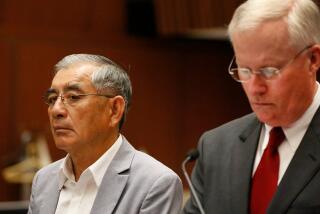Trie Pleads Not Guilty to 15 Charges in Political Fund-Raising Case
- Share via
WASHINGTON — Three days after surrendering to FBI agents, Yah Lin “Charlie” Trie, a central figure in the political fund-raising controversy, pleaded not guilty Thursday to 15 counts of conspiracy, fraud, obstruction of justice and election-law violations.
Standing alongside his lawyers, Trie called out “not guilty” when U.S. District Judge Paul L. Friedman asked for his plea.
Later, a smiling Trie nodded in satisfaction outside the courthouse when his chief defense attorney, Reid Weingarten, described him as “a good and honorable man.”
“He has never been a fugitive from justice. He has never served as a spy for a foreign country. He never intended to corrupt the American political system,” Weingarten told reporters.
Senate investigators, who traced at least $1 million wired to Trie from Asian banks, have suspected Trie was an agent of alleged efforts by China to influence the 1996 U.S. elections.
Despite the fact that Trie channeled more than $1.2 million in largely foreign-tainted money to the Democratic National Committee and to President Clinton’s legal trust fund, all of which was returned, Weingarten warned that “any effort to make him the heavy in this political scandal will fall of its own weight.”
But the attorney refused to answer any questions, the principal one being whether Trie could testify about knowledge or approval of his activities by any high-ranking government officials, including the president.
He insisted that federal charges against Trie, a naturalized citizen, are misplaced. “This is, in fact, a political scandal that’s being shoe-horned in the criminal justice system--it has no place being there.”
While government and defense attorneys refused to discuss the nature of any discussions that might lead to a plea agreement for Trie, a congressional investigator familiar with his activities said: “Charlie Trie didn’t want to be a fugitive. He came back to make a deal.”
At the Justice Department, opinion is split on why Trie decided after he was indicted to end his self-imposed exile--whether it was the likelihood of his apprehension if he traveled outside China, or his hopes of winning acquittal or reaching a plea bargain with the U.S. government.
Judge Friedman set Trie’s trial date for Oct. 7.
Justice Department prosecutor Thomas McNamara told the judge the government is still trying to locate Trie’s co-defendant, Yuan Pei “Antonio” Pan, who also is accused of conspiring to buy influence with high government officials through illegal political donations.
A onetime Little Rock, Ark., restaurateur who has known Clinton for years, Trie formed a consulting firm after Clinton became president. He began raising huge political gifts from Asian donors in 1994. He had easy access to the White House and formed a friendship with Indonesian businessman James T. Riady, a major Clinton supporter who heads the worldwide Lippo Group.
The DNC returned $645,000 that Trie raised after determining the funds came from possibly illegal foreign sources or was given by “straw donors.” Clinton’s legal defense fund also returned $640,000 that Trie had delivered in mostly small checks.
Trie, who had traveled throughout Asia for the past year until his indictment a week ago, will remain free on $200,000 bond. He has surrendered his passport, and his travel will be restricted to the Washington area, Arkansas and Virginia Beach, Va.
More to Read
Sign up for Essential California
The most important California stories and recommendations in your inbox every morning.
You may occasionally receive promotional content from the Los Angeles Times.












